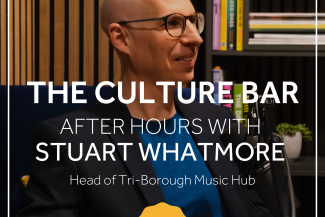In this Culture Bar Podcast, we are delighted to welcome Head of Tri-Borough Music Hub, Stuart Whatmore to the studio. We talk all about the partnership between TBMH and the HP Foundation, upcoming highlights for our partnership and the key issues facing music inclusivity in music education.
Stuart was interviewed by HarrisonParrott’s Digital Communications Officer, Lauren O’Brien.
After Hours chats are a spin-off series from The Culture Bar, discussing issues relating more broadly to the arts and culture sector.
This podcast was recorded on 8 June 2023.
The Culture Bar is a podcast series created by HarrisonParrott focussing on conversations in culture and the arts.
Find us on Spotify, iTunes, Google Podcasts, YouTube, Podbean, Deezer, Stitcher, Pocket Casts and all good podcatcher sites.
Use #theculturebar or follow us on Twitter @_TheCultureBar to keep up with our latest releases
Find out more about Tri-Borough Music Hub: website, Twitter, Instagram.
